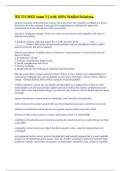ISS 310 MSU exam 3 || with 100% Verified Solutions.
political economy correct answers a theory focused on how the economy is defined as a theory
focused on how the economy is structured by unequal power relations that impact the
environment and our perceptions of the environment
what does "political economy" focus on? correct answers power and inequality with roots in
Marxist social theory
A political economy approach argues that it is the structure of the _________ and ________
_________ within it that create environmental problems and our perception of them. correct
answers economy and power relations
Marxist social theory (Conflict theory) is based on: correct answers 1. Focus on the material
forces of history
2. Evolutionary scheme
3. Systems of production shape society
4. Social contradictions and crises
5. Theory of change
6. Insight and into the workings of capitalism and domination
Marxist social theory correct answers a theory of how to view culture, not a political theory of
communism (although they can run parallel to each other). Develops a theory of how cultures
change - through dealing with conflict caused by social inequalities
modern capitalism correct answers people sell their labor on a market for less than its value,
some people (very few) accumulate capital (cash and wealth), this leads to contradictions and
crises, these crisis can disrupt ecology, environment, the economy, and the health and well-being
of people
means of production correct answers technology, land, factories, and materials
mode of proctuction correct answers the way the production of goods is carried out in society
relations of production correct answers way people organize labor (who does what)
division of labor correct answers workers and owners (work is a relationship)
conditions of production correct answers securing the natural resources to make things (as cheep
as possible)
commoidty correct answers an object that has economic value - made by human labor to be
exchanged
environmental justice correct answers the principle, and research arguing that we need equitable
division of environmental goods (parks, clean air, healthy workplaces) and environmental bads
(pollution, hazards, waste) between people, no matter their nationality, race, ethnicity or gender
, in a substance economy: correct answers people do their own labor, on their own land, using
their own access to natural resources, independently, to meet their basic needs - good are valued
for their use to meet those needs, humans are valued for their independence, decisions, and as
man, women, father, mother, husband, wife, daughter, son, farmer, etc.
what were the enclosure laws in England in 1780-1920's? correct answers 1. The privatization of
communal areas
2. Then some could own the means and conditions of production and some could not
3. Without land, people became mobile laborers who sold their labor to others
4. Surplus labor - labor is sold for less than the value of the products made - this becomes capital
(profit)
why is there always competition between capitalists? correct answers 1. They must keep
innovating
2. They must keep getting a surplus and keep trade profitable
3. One way to keep a surplus is to spend less on labor or environmental issues
4. Must keep expanding the market, finding new markets, creating markets, finding cheap land
and cheap labor (also creating desire for products)
accumulation correct answers 1. If workers control the means and the conditions of production,
there is no need for a surplus value
2. Goods can be sold at their exchange value, which means that they are exchanged for the value
of the persons directly involved in the transaction
3. People have value for their personhood, kin relations, talents that cannot be quantified
First Contradiction of Capitalism correct answers overproduction (to make more money) - but
not enough workers to buy stuff (and workers don't have much money)- so wages are reduced -
and then people can't buy more stuff anyway
Second Contradiction of Capitalism correct answers draw surplus from the natural environment -
then it gets damaged, destroyed, and damage to workers' health - then less profit
why are environmental hazards often located in minority and low-income areas? correct answers
they are more likely to live near hazardous materials because they have less power to protest, pay
to live elsewhere, or move
market externalization correct answers how a business maximizes its profits by off-loading
indirect costs and forcing negative effects to a third party
spatial fix correct answers moving the processes of production or consumption to a new location
- allows capitalism to continue functioning, but contributes to increasing inequality between
places and people (globalization)
What is the Keeling Curve? correct answers a graph made over the span of 50 years that shows
the increase of carbon dioxide
what does the keeling curve show? correct answers overall increase in CO2 emissions, annual
fluctuations related to norther hemisphere seasons (spring: CO2 absorbed; Fall: CO2 released)




